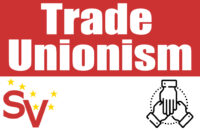In the unlikely event that any of our readers have invested in a significant number of shares in the British company Curry’s PC World, they would be well advised to sell before too long
On a pre-Christmas visit to one of their larger stores I was surprised to find some shelves empty. The goods in question were neither perishable nor seasonal, yet at twenty minutes past opening time on the Saturday before Christmas this huge chain store was unable to offer items that were obviously popular.
Nothing surprising there, you might think. Indeed it used to be viewed as a sign of success when a shop was sold out of a certain range of goods as a result of the frantic Christmas buying spree. Not now, though, especially if your main competitor is operating over the internet and can deliver the same goods and simultaneously guarantee that the customer will not be disappointed.
In brief, the century-old method of chain-store retailing is being challenged by internet trading.
We are now experiencing a profound technological change that is having a massive impact on the working class and its trade union movement. Often referred to as the “gig economy” or “platform economy,” the technology underpinning much of globalisation is presenting a new and different set of problems for organised labour. Moreover, this situation is not confined to retail industry but has an impact over a wide spectrum of service industries, ranging from taxi-drivers to teachers providing external tuition.
Nor is this phenomenon only occurring abroad. In the days before Christmas, for example, the Irish Times was reporting a plan by a company called Mick’s Garage in Dublin to launch what it described as “an Airbnb for garage services,” which would connect motoring customers with nearby mechanics. Investors in the project include wealthy builders, bookmakers, and builders’ suppliers.
What is happening is having just as profound an effect on organised labour as the introduction of mechanised production lines had in the early twentieth century. Now we are finding that instead of having fixed and permanent work-places from where services are provided or delivered, the internet now offers consumers access without the need for a local physical presence. This facilitates the casualisation of labour at a rate unprecedented since the end of the nineteenth century.
Some of the implications of this were demonstrated recently by two decisions made in London in relation to the taxi app Uber.¹ Last September the regulatory body Transport for London refused to renew Uber’s licence for the city on the grounds that it had failed to properly vet its drivers’ competence or security clearance.
This was followed in November by a ruling by the Employment Appeals Tribunal that declared in effect that the company was an employer, and not simply an information platform, as Uber likes to claim. Incidentally, the tribunal’s verdict was seemingly endorsed in December when the EU Court of Justice made a similar ruling.
Before we congratulate these institutions for having provided a major advantage for people forced to work in the gig economy, it is important to consider a few facts. In the first place, Uber is only one company working within this system; other companies, such as Deliveroo² and Airbnb, continue as before, with the former recently getting the green light to maintain its existing British practices as a result of a ruling by the Central Arbitration Committee.
Secondly, Uber, with a market valuation of nearly $70 billion early in 2017, is using its vast financial resources to appeal these decisions. Backed by a clever advertising campaign that claims that forty thousand drivers in London were in danger of losing their jobs, the company collected almost a million signatures demanding that the decision of the Employment Appeals Tribunal be overturned.
Uber is also drawing support from other interested parties in the field. And it is these supporting parties that could prove decisive if they are not counteracted.
The attraction of the gig economy for capital is obvious. As is apparent with the Uber company, this system transfers competition and risk from the capitalist to the worker, reducing wages in the process. The outcome of this type of widespread casualisation will be the creation of a situation not unlike that experienced by dockers in the nineteenth century, when men often fought each other for a day’s pay. Clearly, too, forcing worker to compete with worker for income undermines class solidarity and thus damages one of the essential requirements for a healthy trade union movement.
So how do we deal with this latest manifestation of capitalism in action? Let’s be clear from the outset that it is neither possible nor desirable to prevent the advance of science and with it the emerging technologies that make such things possible. The first step must always be to understand what is happening and to recognise both the problems and the opportunities presented by new circumstances.
Explaining the technology and its impact on working people’s terms and conditions is relatively straightforward but should nevertheless be done as a priority by all those interested in protecting and promoting the cause of labour.
Also, every opportunity has to be taken to counter the insidious populist propaganda that promotes lower prices as the be-all and end-all. All too often a small benefit to the consumer comes at the cost of poverty wages for the worker.
Thereafter, it is important to disabuse working people of the notion that the solution to this problem lies purely in legislation, or in appeals to the ruling class. What appears to be concern for working people is at best enlightened self-interest or, more likely, cynical opportunism. Realism dictates that capitalism will not surrender such an advantage that offers the opportunity to increase profits.
Ultimately the answer lies in the working class taking the means of production, distribution and exchange into its own hands through the guarantee of a Workers’ Republic. In the meantime, the left must not overlook the importance of this issue. We must search for creative means of counteracting this latest encroachments of capitalism, and continue working within the trade union movement and beyond to strengthen solidarity throughout the working class.
- Uber Is a Smartphone application that allows any car-owner to offer a taxi service without the requirement for a nearby office, radio centre, or, usually, any detailed police clearance.
- A British on-line food delivery company founded in 2013 by two Americans.






